
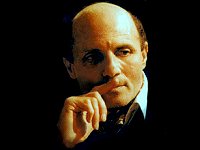

|
 |
|
| Neville
Wortman may possibly not be one of the first names that immediately spring
to mind when reminiscing about the Sixties, but there is no doubt that he
was instrumental, and right where the action was, behind some of the most
iconic shows on British television in the Sixties! Neville has been kind
enough to share a few of his many memories and anecdotes with Sixties City,
increasing our wealth of information about the remarkable personalities
and achievements of that decade. In the Eighties Neville Wortman, through
his own tv production company VENTURE COMMUNICATIONS Soho Square London,
set-up cable/satelite station The ARTS TV CHANNEL where he was chief consultant,
commissioning production and technical staff and producing the early Arts
programme series. He has produced corporate documentaries for international companies including: Boots, Digital Corporation, Merck, Mobil Oil, PowerGen, Rio Tinto Zinc, Standard Chartered Bank and St Ivel. Directing CEOs on camera, Neville Wortman discovered that many company chiefs experienced difficulties expressing the ethos of their organisation succinctly and this led him to a new career in speech and communication training, which you can read more about at Speak Good English Well. He writes: |
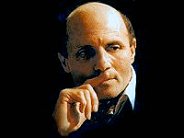 |
I
started my long association with television in my twenties, during the first
weeks of ATV, as a cartoonist/presenter on what must have been the first
British TV Breakfast show 'The Week-End Show', a magazine TV program hosted
by Noele Gordon (later of 'Lunch Box' and 'Crossroads'). We developed a
record spot where I spoke about a current pop singer, drawing their caricature
and then, for 2-3 minutes as the record played, drawing in vision a cartoon
parody on the lyrics. When it started we had one commercial for Silvikrin which kept us on air. This concept took off rapidly and I appeared regularly, three to four times a week, on 'ATV Junior Club', 'The Billy Cotton Band Show' and 'Let's Go', an all afternoon Saturday ITV sports series, drawing in vision to current pop songs between all the sports items leading in and out of the commercial breaks. Wrestling (with Kent Walton) was extremely popular and gave lots of scope to related songs and cartoons and this led to becoming the resident cartoonist on 'Cool For Cats' (also compered by Kent Walton), broadcast twice a week on Associated Rediffusion, featuring a complete record, drawing and animation among gorgeous dancers, including a very young Una Stubbs. I was also a strip-cartoonist, with my own characters from children's television featured in 'Eagle', 'Girl' and 'Robin' - all quality children's comics of the fifties/sixties. |
 |
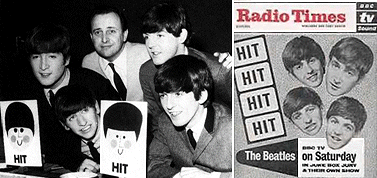 |
I
had always loved broadcasting and was determined to join the BBC as a
producer, but they only recruited from Oxbridge at that time. Eventually
I was accepted for the BBC School for Producers and (with Bill Cotton
Jnr) we were the youngest BBCtv producer/directors. As 'Juke
Box Jury' producer I was instrumental in increasing the huge early
Saturday evening audiences, going head to head with ABCtv's 'Thank
Your Lucky Stars', by inviting famous names from everywhere. Johnny
Mathis raised a storm by rubbishing British artistes of the day, particularly
Tommy Steele.
We lived in an 'ivory tower' at BBC Television Centre where agents, managers and stars came to us in the days when there were only two mainstream tv channels. Given a tip from an A&R for a potential JBJ guest, I invited a then unknown John Lennon to lunch. He came in a leather jacket and was quietly confident as we sat in the canteen and chatted about life and the music scene. John was sure to be a good member of the panel. We always had to find the right mix (a great job, inviting people every week to a party!). The BBC never played 'black music' and it was apparent that that was the sound John (and later the other three) really loved and were drawn to. John was quiet but held his own in a cheeky fashion on the Jury - I can't recall the other panelists. The startling thing then was seeing the BBCtv Theatre on Shepherds Bush Green invaded by hordes of Liver birds up to London from packed trains to see their boy from the Cavern on JBJ. This was my first encounter with Brian Epstein who told me of his trip to London to find a publisher for the first Beatles songs, my recollection of which is that Brian had an appointment with some publishers in Denmark Street (Auerbach, I do believe) who kept him waiting for over an hour. Brian stepped outside for a break, glanced up and saw 'Dick James Music' on a first floor window. In that half-room office began the Northern Songs association. |
|
Dick was an old friend of mine, a very likeable but mainly unlucky song
plugger, so many of his singers and composers were of a previous era. Dick
himself was known for his own title song renderings 'Robin Hood' and 'Davy
Crockett'. Sitting in Dick's substantial new office some time later, with
at least a dozen 'Queen Elizabeth Award for Industry' logos across his notepaper,
Dick gave me his chubby, wide mouthful, toothy grin and said, "Neville,
right now I couldn't tell you just how much money is coming in . . . " Brian Epstein, in those heady days, longed for personal recognition too, needing to prove himself artistically; incapable of presenting or performing convincingly on camera, but as manager of The Beatles - supreme. It was Clive Epstein whom we dealt with mostly for organisation and finance, charming like his brother but sure and dependable. Few of Brian's acts really made the big time except Gerry and The Pacemakers, Billy J.Kramer (the good looking one) and Cilla Black, who topped it all when she made her first appearance on JBJ and never looked back as a personality after her appearances with us. A mother from Glasgow brought her teenaged daughter to me and we featured her in a pilot where Lulu belted out 'Shout', a performance later repeated in my Rolf Harris tv series. When we first met she confessed she would really like to sing like Ella. As one of the original producer/directors with founder, Johnnie Stewart of 'Top Of The Pops', we started in the old disused Church in Didsbury, Manchester, at a time when Granada was stealing the scene - Granada and Coronation Street WAS Manchester. TOTP packed the kids into that church like sardines - there was no such thing as 'Health and Safety' then and amazingly, to the best of my knowledge, no one was ever hurt. I always remember our number one cameraman's voice, as we counted down to go 'live' in that wonderful old church, coming quietly over the 'cans' ... "May the Good Lord be with us . ." and we very quickly all knew He was. We only had to include a number for a couple of weeks then for it to zoom into the top twenty. For some reason I always recall Dave Berry's rendition of 'The Crying Game' on the night that the local police were waiting for him in the wings. And, of course, my mates at that time, those DJ's who helped make the programme such a success: Pete Murray (who was such a good actor - a distinction at RADA and his serious acting role as Hilary the wartime RAF hero Spitfire pilot), Alan 'Fluff' Freeman (our friendship began when he came from Australia to tell stories to my cartoons on children's tv), Jimmy Saville (who somehow, strangely, no one seemed to really know yet when he drove down Manchester High Street in his white Rolls everyone surely did and showed it with their cheers) and dear David Jacobs, always calm, always suave, always the true professional, with a voice that won the ladies' hearts. |
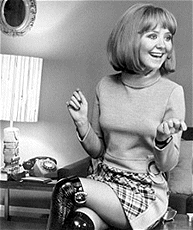 |
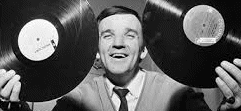 |
I was invited to join The Royal College of Art, the world famous university
granted by Royal Charter to grant its own degrees since 1800, where there
were sixteen schools, all attached to industry, like the renowned Fashion
School, and where tutors are also required to carry on their own work. We
developed The School of Film and Television, training directors, designers
and animators from around the world such as Tony Scott, Richard Loncraine,
Albert Watson etc. One of my first students at Royal College of Art Film and Television School - aged 21 years, Tony Scott's stood out as one of the most outstanding submissions. He was the brother of Ridley Scott who, as a designer at BBCtv, I had previously worked with. Tony's submission film was extraordinary, a short about an incident in the American Civil War; Tony had got together a large group of civil war enthusiasts a full cast with their own uniforms and cannon for the movie which he wrote, directed and shot on 16mm, based on an early story 'Incident at Owl Creek'. Tony's love then was Camera and he shot a number of his fellow students' final year films. I remember him even then as the most likeable,wonderful humorist and a highly skilled, inventive film maker. |
|
On
a lighter note, Dionne Warwick is celebrating her seventy plus years as
a superb jazz singer - I shot a version of 'You'll Never Get to Heaven'
high up on the roofs of Belgium for one of the first 'Top of the Pops' free
style location filming inserts for the show. She was also due to perform
that evening with the Belgium state orchestra - a concert we were also invited
to attend and where earlier in the day during sound rehearsal, being the
perfectionist she is, refused to perform with them saying the whole set-up
had no feeling or sensitivity for her numbers - the authorities finally
gave way and flew in her own combo from the States for that night's live
radio performance which was wonderful - what a performer ! At that time I was also a producer/director for ABCtv and Thames director of The Eamonn Andrews Show, one of the first late night entertainment talk shows, which built its audience in excess of 10-11 million viewers. On one outstanding guest night we had Cassius Clay (who that night announced his name change to MOHAMMED ALI) along with Noel Coward who told the audience that he was born only a mile or so away along the river near the Teddington Studios at 'Tide-end-Town'. He leant over to Mohammed Ali and confidentially, asking about boxing, enquired "Does it hurt?" Also on that night was Lucille Ball, the legend who arrived with agents, manager and a full make-up team, setting the camera angles and depth of focus for her medium and - close-up shots with lens gauzes. There was the wonderful Dudley Moore who was at his happiest at the piano and who would never appear without his trio. Musical guest that night was jazz icon Carmen McRae performing with a white grand piano on a tower above the audience. Completing the evening's line-up was an American comedian, Milt Kamen, but the poor guy could hardly get a word in that night. The studio was packed with a 'showbiz' audience that included Ned Sherrin. We began our careers together when he was ATV stage manager on the Week-End Magazine breakfast show. That night ABCtv were granted permission to over-run and the following day's transmission controllers cut the cricket coverage time. On another edition of the programme Shirley Bassey was billed to appear with a 70-piece orchestra for the show's recording and transmission that night at 11.00pm. |
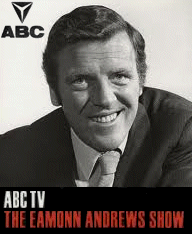 |
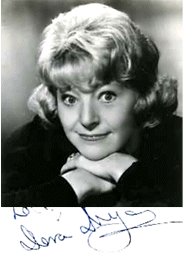 |
During
afternoon rehearsals Kenneth Hume (manager and a somewhat Svengali figure)
refused to accept the quality of sound balance on her numbers. This was
not so unusual in those times as it was a near impossible task to match
original studio recordings, but the situation became more and more heated
until eventually Miss Bassey locked herself in her dressing room and refused
to budge. The ABCtv management came down as she was scheduled and advertised
to appear on their top show. Someone informed the press and all the nationals
arrived. The audience arrived at 8.30pm but still the arguments raged on. The other guests - Kenneth Williams and Dora Bryan, bless them, kept the audience happy with jokes that gradually became dirtier and dirtier! We arrived at a point where, short of cancelling the show, the only choice (if we had one) was to go live at 11.00pm. Shirley remained conspicuous by her absence, and sitting in the control room with producer Malcolm Morris, heads in our hands, I had a sudden thought! I went to her dressing room, gingerly knocked on the door, said my name and, miraculously, Shirley opened up. I remember going down on my knees saying something like "... there's this audience here and out there for you, darling, the real star and professional..." She agreed, and ABCtv went 'live' at 11.00pm with no rehearsals. The Clancy Brothers were also billed and had flown in from New York, but we met for the first time just minutes before the start, barely time enough to show them where to come in, where to stand and where and when to exit. Shirley's was a brilliant performance, the orchestra was wonderful, the crew were hyped up and united - the studio audience were 'fully warmed up' and ecstatic, a sensually charged moment in the show! Shirley went on to do many major shows for BBC but never again for Thames! The work continues with one of my twins, Matthew, who directs for BBCtv and Discovery, and more, under our production company Polestar Pictures. Copyright Neville Wortman and Sixties City 2015, 2025 |
|
|
All
Original Material Copyright SixtiesCity
Other individual owner copyrights may apply to Photographic Images |